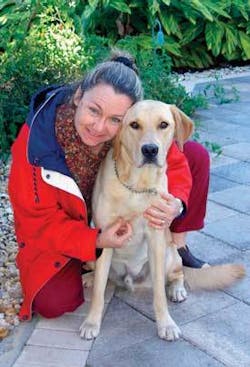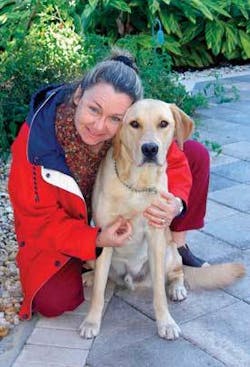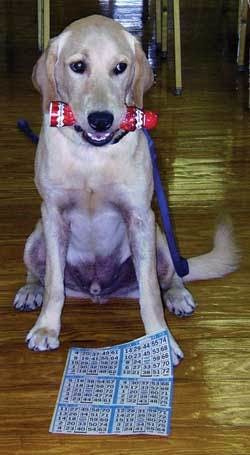Bringing Up Bingo (Bingo Is His Name-O)
by Jane Weiner, RDH
Dental hygienists are a special group of ladies and gentlemen. We have a nurturing, parental type of personality, and we are always looking for ways in which to be of help to patients and people. We also have very diverse interests. A good example is a personal friend of mine who accepted a huge commitment and responsibility in raising and training a guide dog puppy for the seeing impaired.
Cathy Schechter, RDH, BS, and I have discussed the qualities that we both have that are so similar. We talk about how we treat patients with the same type of care and interest. These similarities have overflowed into our personal lives.
Recently, Cathy was focusing on cleaning her operatory when the unusual muffled sound of human crying from the front desk area snapped her out of her routine. It was her next patient who was obviously upset. Cathy rushed to comfort her and quickly ushered her to the operatory. It was painfully obvious that the patient had not made it to the restroom quickly enough and was utterly embarrassed.
Cathy has worked in a geriatric practice for five years, and knew well that accidents do happen. She reassured the patient and quickly placed the plastic sheeting on the dental chair (available in this office for such emergencies) and sat the patient down to comfort her. Tears streamed down the patient’s face and Cathy promised to be right back with some towels. Before Cathy could even take a step, the soft and silky head of Bingo (a guide dog that Cathy is raising) rested gently in this grandmother’s lap. His warm brown eyes searched her tearful face in soulful understanding.
The connection was immediate. The patient’s hands slowly came off her face and lovingly rested on Bingo’s head. Her crying stopped instantly.
“This is Bingo, the puppy I am training for the blind,” an amazed Cathy explained. Her patient stroked Bingo’s head and replied, “He is so beautiful and sweet.”
The opportunity to help see
Cathy said she has always had a love affair with dogs - having them as pets and training them has been a lifelong hobby of hers (RDH referred to Cathy’s racing of sled dogs in a 1995 article). After many years of working and living with dogs, Cathy truly understands the power of the canine senses and their healing powers.
The Schechter family moved to Florida with a 12-year-old search-and-rescue canine companion. When the dog died, an opportunity presented itself for Cathy to fulfill a lifelong dream. Raising a “guide dog” puppy for the seeing impaired was one of those life accomplishments that Cathy felt would bring her and her family much pleasure and pride.
In many ways, Cathy’s family is a typical one. She and her husband, Irwin, are involved with their two teenage children and their sports and school lives. They are active in their community and both also hold full-time jobs.
Cathy felt it would be an enriching experience for the family to raise and train a guide dog, and it would help keep them from making a lifetime commitment to a new family dog at this stage of their lives. The two children are in high school, and she felt that the time that they could experience this process was quickly fading away. She knew that this would be a learning experience for the children as well as a most humbling one.
Cathy did some research and found out about Southeastern Guide Dogs by accident on a Web site. She filled out the required forms. Many months later, her family received a home visit from the Southeastern Guide Dog’s area coordinator.
Knowing that one has to return the puppy to the school after the puppy is grown (16 to 20 months later) is perhaps the hardest hurdle for people to overcome. Families become attached to the animal as they would to any pet, since the dogs become a member of the family.
The next big obstacle was the initial commitment to change her work schedule. Cathy did not want to leave an 8-week-old puppy home alone for eight hours three days a week (as her hygiene job required). It is critical for the guide animals to have a socialization process. The area coordinator informed her that the school strongly recommends that the puppies accompany the raisers to their workplace. This information was not part of the previous information Cathy had read. Now she had to face “what to do with the dog and her life if she took on this challenge.”
Cathy had been willing to adjust her work schedule at the dental office. When she approached her employer with the expectation and determination that she would take a leave of absence if that’s what it took to raise this pup, she was thrilled to find out that the doctor wholeheartedly supported the endeavor, especially since the goal was to raise a dog that would give a seeing-impaired person the gift of mobility and freedom. Everyone in the office at that time owned a dog except Cathy, and she and the doctor knew that the office staff would all be supportive of this commitment on her part.
Puppy appointments in a dental office
A beautiful Goldador (half Labrador retriever, half golden retriever) puppy was delivered to their house on May 8, 2003. The International Lion’s Club - which is a strong supporter of guide dog schools - of Inverness, Fla., sponsored the puppy. The puppy was named by the group. This club receives a majority of the money to support the guide dog project through bingo fund-raising programs.
So guess what the puppy’s name was? Bingo!
Most guide dogs “in training” are specially bred by the guide dog organization and Bingo is an unusually special, warm, loving dog who is almost “humanlike” in nature. These dogs are given the same courtesies other working dogs are awarded in all restaurants and in all public and private facilities.
Bingo spent his very early days in a crate in the office lounge with the entire staff fussing over his every need. Everyone on staff knew never to give him “people food” or to pet him while he had on his “working jacket.” Patients came to know Bingo when the dog quickly became part of the dental office’s “family,” and they would request to see Bingo. Cathy’s patients brought him toys and biscuits practically every day that he was with her in the office, and he managed to endear himself to them and become a part of their hearts. As Bingo matured, everyone knew his days at the office would all too soon come to an end. Twenty months later, everyone bid him a very teary fond farewell on January 20th, 2005, when Bingo was returned to Southeastern Guide Dogs, Inc. to complete his guide dog training.
A day does not go by without a patient asking about Bingo. The dog really did become an integral member of the office. He learned to guide, he learned to be a friend, and his legacy is in all of the good deeds that he performed not only in the dental office, the Schechter’s home and neighborhood, but in the life of someone who today is being cared for, guided, and nurtured by him. Needless to say the Schechter family misses him very much, but they are also glad that they had a pivotal role in raising Bingo.
Many dental hygienists have so many diverse interests in their hectic lives. In my opinion, when someone opens their heart to experience such an enriching and needed volunteer job such as this one, it places that person on such a high pedestal. Not only was the puppy raised with love, but the family was also enriched and grew from this wonderful experience.
For more information about being a guide dog puppy raiser, go to: Southeastern Guide Dogs, Inc. (http://www.guidedogs.org) or to any other guide dog organization in your area. Cathy Schechter can be reached at [email protected].
Jane Weiner, RDH, a 1964 graduate from the Forsyth School for Dental Hygienists, conducts dental hygiene and dental board review courses (www.janewrdh.com). She is a 2006 recipient of the Sunstar Butler/RDH Award of Distinction, the 2005 recipient of the Philips Health Care Mentor of the Year Award, and the 2003 recipient of the Dr. Esther M. Wilkins Distinguished Alumni Award. She is an adjunct faculty member in the predoctoral periodontics department at NOVA SE College of Dental Medicine in Ft. Lauderdale, Fla. Jane is a frequent contributor to RDH magazine, and she can be contacted at [email protected].


